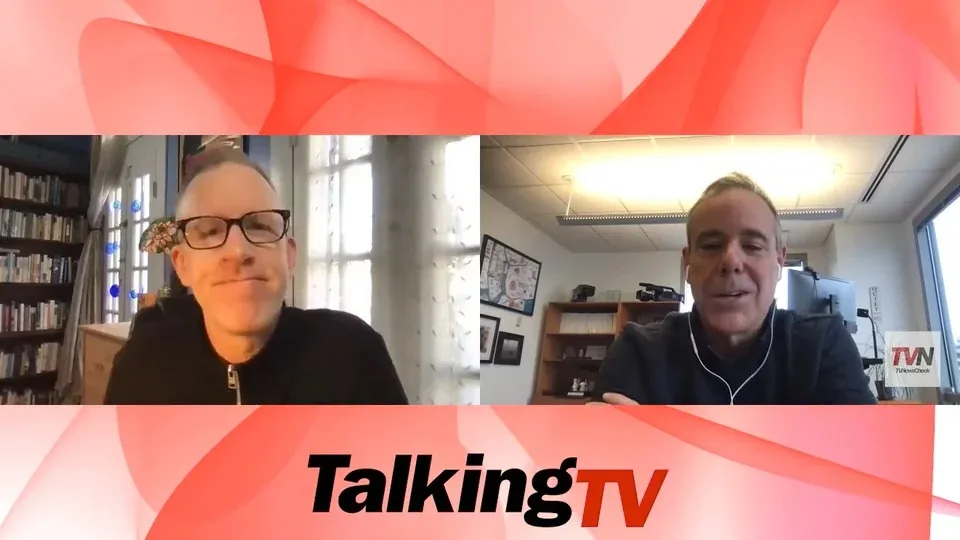Talking TV: Local TV’s Burnout ‘Really Is A Crisis,’ Says New Study
It probably came as little shock to anyone working in a U.S. TV newsroom when journalism professors Bob Papper and Keren Henderson released their most recent newsroom survey for RTDNA/The Newhouse School at Syracuse University. The headline was that burnout has hit scorching levels, and superficial newsroom attempts to cool it down don’t involve nearly enough water.
In this Talking TV conversation, Papper and Henderson share some of the reams of anecdotal feedback they picked up from news directors in compiling the survey that point to the severity of the problem. They share the mindset of young employees who prefer to bail on broadcast rather than hang onto untenable situations. And they highlight the exhaustion of news directors themselves, most of whom lack the power to improve the conditions wracking their newsrooms.
Most importantly, they discuss the likeliest accelerant for burnout — woefully insufficient salaries, especially at the starting level in small- and medium-size markets.
Episode transcript below, edited for clarity.
Michael Depp: TV news is suffering from a serious burnout problem. According to this year’s recently released RTDNA/Newhouse School of Syracuse University survey, almost 70% of all news directors see more evidence of burnout among their employees than in the past.
For anyone who works in a TV newsroom, there’s probably nothing surprising about that number at all. And given the survey’s other headline that local TV news employment is up 5.1% over last year, maybe it’s not quite at a crisis level yet. But that figure doesn’t take into account the closure of five Sinclair newsrooms this spring, which might themselves go a good distance toward wiping out that gain. The point is burnout is a massive problem and we need to talk about it. A lot.
I’m Michael Depp, editor of TVNewsCheck, and this is Talking TV. Today, a conversation with Keren Henderson and Bob Papper, the two Syracuse University journalism professors who conducted the survey. We’ll get into what they heard from news directors about the burnout problem and what, if anything, those news directors have been able to do to stem it. We’ll be right back with that conversation.
Welcome, Keren Henderson and Bob Papper, to Talking TV.
Keren Henderson: Thank you.
Bob Papper: Thank you.
Michael Depp: Keren, 68.9% of news directors are seeing more burnout among their staffs, with the average being a little bit better in the top 25 markets, 59.4% say it’s worse there, presumably because those folks are being a good bit better compensated for their misery. Can you paint a picture of what your survey respondents are telling you?
Keren Henderson: I guess in a sense, they’re telling us that that they’re having trouble recruiting, retaining employees, making those who are still there feel wanted, happy, appreciated. Their hands are tied in some cases. It’s a really stressful time for workers and management alike, it would seem.
The word “exhaustion” seems to come up as a constant refrain in the report. Related to that, so does taking a lot of sick time. Why are they so exhausted, Bob?
Bob Papper: Well, you know, this industry has always demanded staggering hours. You know, I mean, I started in this business full time over 50 years ago, and it was it was bad then. But, you know, we did it because that’s what you do. Because that’s what the ethos of the times said that you do. Times have changed, people have changed, demands have changed. And I think it really has probably become a crisis. I don’t think we’re at that that stage where we need to worry about it somewhere down the future. I think we need to do it now.
Someone was telling me recently that it used to be the case that you’d have this real flurry of activity build up to something, you’d have those intense hours and then you’d get these pauses and there would be respites between kind of hurling into the next giant story or the next very serious coverage that bled into your life. Those pauses are the things that have gone away. Have either of you heard that kind of sentiment expressed?
Bob Papper: Oh, sure. I mean, when I started, news was a half hour at 6 and a half hour at 10. I was in Central Time. And that’s what you did. That was that was local news. You know, we now relentlessly produce local news hour after hour. We do it morning, we do it midday, we do it early, mid-afternoon, we do it late afternoon or into early evening and then again late evening. Because once you’ve spent the money as a station, once you’ve spent the money to establish a news department, the incremental cost of adding more news is comparatively small. The problem is that stations keep adding that kind of news. They don’t add that number of people. So, the burden is higher and higher and higher every year, relentlessly year after year.
People used to be pretty terrified about breaking their contracts. Is that less the case now?
Keren Henderson: I don’t know if they’re more or less terrified, but they’re certainly willing to check that they can.
That nuclear option is more readily available to them now?
Keren Henderson: I belong to a lot of Facebook groups for journalists, and the conversation steadily has increased to have that discussion. “Can I break a contract? Can someone from company X, company Y? DM me. I’m concerned. My management is threatening to make good on the buyout. Will they really come after me?” I just know I’ve seen a lot of that talk.
Bob Papper: At least some of it is that at the salaries some of these people are making, especially in small and medium markets, it’s kind of, you know, how much do they have to lose?
Well, that brings up my next question, because in the litany of anecdotal reasons that you share for burnout in the report, I didn’t notice money in there at all. Did anybody talk about money?
Bob Papper: Yeah, they do. You know, especially in small- and medium-sized markets. Starting pay is painfully low. I looked up the number, I was curious. The average starting salary for a college graduate nationwide is $55,000. That’s about double what the average starting salary in TV news is. You know, it’s gotten worse. I played around with some of these numbers. I started full time in 1970 at $175 a week. And the station was embarrassed that it was only paying me $175 a week. Adjusted for inflation, it’s over $71,000 today. So, if it’s more than double what they’re paying starting people today, is it a factor? Of course it’s a factor. I mean, this is, remains, one of, if not the lowest paying professions a college graduate can go into.
Keren Henderson: With one of the more expensive tuitions to have the common permission to do the job.
And the average tuition for a J-school being about what right now?
Keren Henderson: Oh, that’s a good question. I don’t know offhand.
Bob Papper: It varies depending on if it’s a state school or private.
Like 50, 60 grand here, typically for a private school, j-school education?
Keren Henderson: But you don’t take into account living expenses and all of that. Sure.
Bob Papper: OK.
Your report also looks at how people are trying to start to begin addressing this. You cite some more anecdotal things that newsrooms have tried, notably their food-oriented efforts like cookouts and gift cards and staff fun committees. I mean, maybe I’m missing something here, but it seems like those are pretty flimsy Band-Aids to put over massive festering wounds.
Bob Papper: That’s an old day answer to a contemporary problem, and it’s not working. I mean, you know, years ago, I think you could probably get away with that, at least to a certain degree. You know, “we’re all in this together” and that kind of thing. But yeah, some places are doing still doing cookouts and bringing in food or food trucks or whatever kind of the modern version, I guess, of, you know, cookouts. But what a number of the news directors say is that it really isn’t working. It’s not even a Band-Aid, much less a solution to the problem.
Keren Henderson: I would say notably though, there’s also a good number of references to mental health efforts.
Right. And I want to talk about that. I mean, on the more efficacious side, there does seem to be an acknowledgment that there are widening mental health needs in this profession that need to be addressed. So, on that front, what are some of the more substantive efforts that you have seen underway there in your discussions?
Bob Papper: Well, I mean, there’s counseling, bringing in counselors, and there are companies that are doing that as a policy and bringing counselors in on a regular, I think monthly probably is the most common basis, to deal with people. Whether, you know, is that a long-term solution… no, I don’t think so. But is it helping? Probably. But that still doesn’t answer, is this job working for me in that grand scheme of life? You know, counseling, I think, helps you cope. But I don’t know that it addresses that bigger problem.
To put a finer point on what the counseling scenarios were that you came across, I mean, this is kind of like a Ted Lasso situation where someone comes in to work with the whole team? They kind of get little sessions on the side?
Keren Henderson: Yeah, I think we saw both. I think there were some references to group conversations and some references to one-on-one needs. I mean, certainly I would think that it’s also we didn’t ask this, mind you, but we could. Health insurance and coverage in general… it’s wonderful that there are coverage offerings, but do those companies that offer medical coverage extend that coverage to include personal? My choice where I want to go to get my therapy for my life? I don’t know.
Bob Papper: Since you asked that, we asked about benefits, beyond salary, and we did it two years in a row. And normally you wouldn’t see any kind of difference from one year to the next. But we did in in a few areas, including health benefits, which have gotten better just in the last two years. And, you know, is that because of mental health issues? You know, we don’t know that, but it could be.
I know that drilling into those mental health issues wasn’t the focus of your survey, but inasmuch as you’re able to speak to this, how common are those efforts to target mental health concerns for journalists and how widespread? Also related to that is the acknowledgment that this has become a serious problem and it might now need to be addressed in this industry at scale.
Keren Henderson: I mean, I think just the energy from the responses would imply that there’s a need for this question. And the fact that you’re speaking to us right now is another good indication that there is a need for this question. But maybe you have a more specific answer in terms of the details of the results.
Bob Papper: Well, I got this email two hours ago. Literally two hours ago, was unsolicited. I didn’t ask. I haven’t even talked to this news director in ages. But doing this survey is really a year-round job. And we talk to news directors around the clock, which is where a lot of these questions come from is because news directors talk about the problems that they’re seeing in the newsroom, and they talk about hires they can’t make and that kind of thing. I need to protect the name of this person, so all I’m going to say is that this is a very successful, very experienced TV news director in a major market.
And let’s see, “I’ve been out of news for almost X number of months and I’m happier than I’ve been in a very long time. The burnout is real, the lack of resources and people is real. The mental health crisis, especially among younger journalists, is real. The lack of support from HR and senior leadership is real. Racism is real. Sexism is real. Retaliation is real. Your latest survey hit the bullseye. So, after a lot of years, most of them in management, I quit, and it turned out to be one of the best decisions I’ve made. Don’t get me wrong, I had many great days in my career, but the bad ones were outnumbering…
That is a pretty damning thing, especially coming from a news director. Some news directors are the empowered people here, are they not? Is it just that they they’re not sufficiently empowered to seriously address these conditions?
Bob Papper: Well, that is what we think. I mean, we view them as the empowered people. And as you can see from that news director, that person didn’t necessarily feel that way.
They’re kicking that ball in other directions.
Bob Papper: Well, you know, I remember back in the ’90s and the 2000s, I would talk to news directors about how little they were paying and how disgraceful it was, and they’d all agree with me. I mean, they all say, absolutely, but my general manager or my company, it’s always someone else but says, look, they’re lined up out the door to work here at these low salaries. Why should we pay more if they’re lined up to work? But they’re not anymore. Right.
That was one of the other findings in the survey, is how many unfilled positions there are in this industry. Yeah, the staff grew, but there are between 2,000 and 2,500 unfilled positions in local TV news that news directors say they could hire if they could find someone to do the job. So, it really is a crisis.
For which positions where was there the most acute area of need?
Bob Papper: The most acute areas were MMJs and producers, and they accounted for 41% of the unfilled positions. News anchors and news reporters as opposed to MMJs, we separate those. They combined for 20%, digital photographer and weather accounted for 8% each and that’s most of the total. It’s actually pretty across the board.
MMJs and producers are very stressful jobs with constant daily demand. You have to be able to play a lot of instruments to do those jobs. So, that’s not a shock. I mean, nothing here is going to come as much of a shock to anybody who works in a TV newsroom, nothing we’re talking about.
And you add to that they’re subject to constant threats and harassment, albeit largely by anonymous email and social posting, but sometimes it’s also in person. People are utterly flippant about calling their work fake with absolutely no substance to attach to the slurs. And, you know, as we’ve already touched on here, maybe worst of all, their daily workload seems to be orders of magnitude higher than the same job had a generation or even a decade ago.
So, you have to have a deeply held sense of mission or masochism or both to do these jobs. I mean, so as you look at all this, you get all this feedback, is this not a reasonable response for a professional to have in working under these conditions?
Bob Papper: Absolutely. I mean, I don’t think there’s any question about it. I think the bigger question is to what extent the industry is going to take this seriously and what they’re going to do to turn this around. And it’s not going to be easy.
Keren Henderson: I think that an additional problem is that we’re already seeing the consequences of decisions. So, it’s not what are we going to do soon? It’s what didn’t we do already, and we have to backpedal some.
Well, all right. So, this lays out a lot of problems there on the carpet. Who do you hope really sees the survey?
Bob Papper: Well, I mean, the key is the people who make the ultimate decision. We’re talking about corporate decision makers. We’re not talking about news directors. News directors aren’t making the budget.
Group-wide news VPs? Is that who we’re talking about here? Is it the C-suite?
Bob Papper: Yeah. I mean, it’s the people at corporations. It’s not just the corporate news directors, it’s the people they work with as well, because at the end of the day, these are major budgetary decisions. I would argue it’s going to cost a lot to fix.
Want to put a number on that?
Bob Papper: No, no. I mean, but everything costs money.
Well, we’re also talking about this in the context of a lot of these companies, these larger companies are publicly traded companies and their shareholders need to hear this, too. Will they give a damn?
Bob Papper: No, probably not. But why is it that the TV industry has to produce profits at a level far exceeding the average for American industry?
Keren Henderson: You asked for a number, Michael, it’s your organization puts out the numbers, right? Every year you give us a nice chart with the profits for every one of these companies.
We just ranked them in top 30 and what they’re worth.
Keren Henderson: That number is in there somewhere.
Well, OK. So, let’s say the C-suite. Let’s say we have their ear with this conversation, which we may very well have at a number of these companies. What do you want them to take away from reading this survey?
Bob Papper: There are a whole bunch of things that need to take place and everything costs money. The pay has to be higher. I mean, the reason that the crisis is at least a little lower in the top 25 markets is that, as you noted in the beginning, that they’re paid more, and that helps.
Let me just jump in on that. So, they’re starting at like around 25-ish or so, you were saying earlier?
Bob Papper: Well, we’re now up to closer to 30. That varies. We still have a lot of people starting at around minimum wage or well, there are companies that start at $15 to $18 an hour. So, if you block that out…
You can make that a McDonald’s.
Bob Papper: You can make better at McDonald’s. Most McDonald’s are I think in the $20 to $22 an hour range. Why in the world is TV news below that?
Let’s get prescriptive a little bit instead. What’s a reasonable starting place? Let’s start with that in a small- to medium-sized market. What should be the baseline salary?
Bob Papper: Oh, I think we probably should be looking at $40,000.
Keren Henderson: I would agree, something where you can pay your rent and know that you have food all week long and can pay or utilities and put gas in your car and keep your cell phone running.
Bob Papper: And not have to live with three other people in order and count on checks from home in order to survive. Because what happens is, you know, after a relatively short period of time, we’re turning over a huge percentage, I think, of our kids who were interested in doing this and found they really couldn’t afford it, or it just didn’t make sense for them.
Any other immediate prescriptive things that we can just leave on that note right now to start thinking about? Forty grand a year…
Bob Papper: Well, yeah, we’ve got to figure out work/life balance. The thing is, we’re running too tight as it is because we keep adding news, but we don’t add the same percentage of people that we’re adding in terms of news, which means that we’re demanding more and more time from the people who we have. And we have vacancies because we can’t recruit enough people because they don’t want to work under these conditions, which means that we ask even more of the people who were in our newsrooms because we’re short staffed. We can’t do that. I mean, that’s an absolute prescription for failure.
Keren Henderson: I don’t see how we can tease some of these things apart because I see so many people, again, anecdotally discussing their side hustles. If you have to now leave your very busy newsroom job to make enough money to pay your rent. And I assume you can’t do that in a minute or two after work. What work/life balance? You’re never not working. Wouldn’t even sleep.
Right, right, right.
Bob Papper: The industry needs to hire more people, which they say they’re trying to do. But, you know, there’s a reason they’re having trouble hiring people, which is that they’re not paying them enough. And they’re offering what has always been a family-unfriendly kind of industry.
Some heartfelt reexamination needs to be done here across the board.
Bob Papper: Yeah.
You’ve been doing this for some years. These surveys and these numbers keep going up, the burnout numbers seem to be dramatically on the uptick. You’re just grinding in the next couple of years on this. I said it’s maybe it’s not a crisis because we’ve got this percentage, you know, these other kind of countervailing numbers. But is it a crisis, and is it a crisis that’s going to come to a head in the next couple of years? Is the election year and all the stress that’s entangled into that and the Gordian knot of that issue going to exacerbate this to a point of no return?
Bob Papper: I think it’s already a crisis, frankly. And I think that mostly what the industry doing is a lot of Band-Aids to try to keep it going. If there’s a long-term plan someone has for solving this, I haven’t seen it. There have been some efforts and some real, meaningful things to change, not just the counseling, which I would argue is kind of a Band-Aid, because, you know, you’re counseling people in a lifestyle that’s probably unsustainable.
So, what you really need to do is change the lifestyle so that it’s workable. And I think that means you need to do some fundamental changes in the industry to be able to, which includes the salary. We have a couple stations that are experimenting with four days on, three days off. You know, what I haven’t heard anything on is how that’s working, although there are a couple at least anecdotal reports that that helps in some cases. I’ve got a news director who says he tries to give producers at least one day off, a week off.
One day out of seven or one extra day?
Bob Papper: Well, one day, theoretically, one out of five. But, you know, a lot of these things are well-intentioned, But, you know, people get sick. People are under stress. The station is short-staffed, and these things are well-intentioned, but they don’t necessarily happen on a regular basis.
I also think, you know, the people who go into this business, especially if the salaries they’re being paid, are doing it because they want to write, they want to communicate with people. They want to tell stories. If you don’t give them at least some time to do projects that really mean something to them, they’re not going to stay. Because that was why they went in to begin with.
So, I mean, it’s hard to pin that kind of thing down and then you have to let people do it. Well, years ago we complained to the news director that we needed more people because we were all working 60 hours a week. And he said, well, don’t make this show as good.
That’s a hell of an answer.
Keren Henderson: Yours said that to you in so many words. I think mine was more indirect.
Bob Papper: Inartful in those words. And, you know, and I think that was part of why I didn’t stay. You know, you can’t say that to somebody.
Keren Henderson: Yeah.
Bob Papper: Especially what you’re paying. You can’t say that to somebody.
And it’s pretty clear we’re not going to build the bridge over this chasm out of Starbucks gift cards to solve this problem.
Well, I’m feeling pretty bad right now. Definitely not an upper this one but needs to be said and a lot more needs to be said about it, including looking into these new terms that are trying some different schedules I think is something worth following on. And anything anybody has, any substantive ideas. People have to alleviate some of this pressure and achieve that work/life balance. There are some things that we need to hear about.
Well, Keren and Bob, I can feel my own blood pressure has risen considerably just talking about all of this. But thank you for discussing the RTDNA/Newhouse survey with me today. We’ll post a link to the survey with a transcript of this conversation. Thanks for being here.
Bob Papper: Michael, Happy to do it.
Keren Henderson: Same here.
Thanks to all of you for watching and listening. You can catch past episodes of Talking TV at TVNewsCheck.com and on our YouTube channel. We also have an audio version of the podcast that’s available in most places you get your podcasts. We are back most Fridays with a new episode. Thanks for watching this one. See you next time.































Comments (1)
TVGuy says:
July 14, 2023 at 8:39 am
TV News is now suffering from what other departments suffered through starting in the early 2000’s. Staff reductions and hiring freezes, yet the workload and demands just increased. I personally worked 6 days a week, 12 hrs+ a day as a manager and on the occasion I didn’t answer an email at 1130p or a text at 430a on a Sunday. I was told I lacked a “sense of purpose”. I finally left the business completely and am happy as a technical construction manager. Yes, people account for up to 80% of a stations’ operating budget, and times right now are financially trying. However, good people cannot work under this type of pressure without burning out, and leaving.